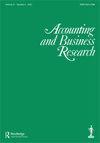Does mandatory disclosure of firm’s tax avoidance position affect corporate investment efficiency?
IF 1.4
4区 管理学
Q2 BUSINESS, FINANCE
引用次数: 1
Abstract
This paper examines the effect of a firm’s tax avoidance position disclosure on corporate investment efficiency by utilising an exogenous shock to corporate tax reporting that mandates firms to disclose uncertain tax positions in their financial statements under Financial Interpretation No. 48 (FIN 48). We find that, after FIN 48, firms claiming uncertain tax benefits (i.e. affected firms) experience a significant decrease in investment efficiency relative to firms that do not have uncertain tax positions (i.e. non-affected firms). Our finding suggests that, despite promoting transparency, FIN 48 imposes an unfavourable information revelation effect that reduces investment efficiency for affected firms. In terms of the mechanism, we provide evidence that affected firms experience a larger increase (drop) in cost of capital (external financing) following FIN 48 and rule out an alternative explanation that the decreased investment efficiency may arise from internal liquidity constraints. In cross-sectional analyses, we find the adverse effect to be more pronounced for firms with higher disclosure quality, higher tax uncertainty, and more severe financial constraints. These findings provide insight into the debate on why firms sometimes forgo tax avoidance opportunities by pointing out a potential cost of tax avoidance.强制披露企业避税状况是否会影响企业投资效率?
本文章由计算机程序翻译,如有差异,请以英文原文为准。
求助全文
约1分钟内获得全文
求助全文
来源期刊

Accounting and Business Research
BUSINESS, FINANCE-
CiteScore
3.40
自引率
11.80%
发文量
38
期刊介绍:
Accounting and Business Research publishes papers containing a substantial and original contribution to knowledge. Papers may cover any area of accounting, broadly defined and including corporate governance, auditing and taxation. However the focus must be accounting, rather than (corporate) finance or general management. Authors may take a theoretical or an empirical approach, using either quantitative or qualitative methods. They may aim to contribute to developing and understanding the role of accounting in business. Papers should be rigorous but also written in a way that makes them intelligible to a wide range of academics and, where appropriate, practitioners.
 求助内容:
求助内容: 应助结果提醒方式:
应助结果提醒方式:


